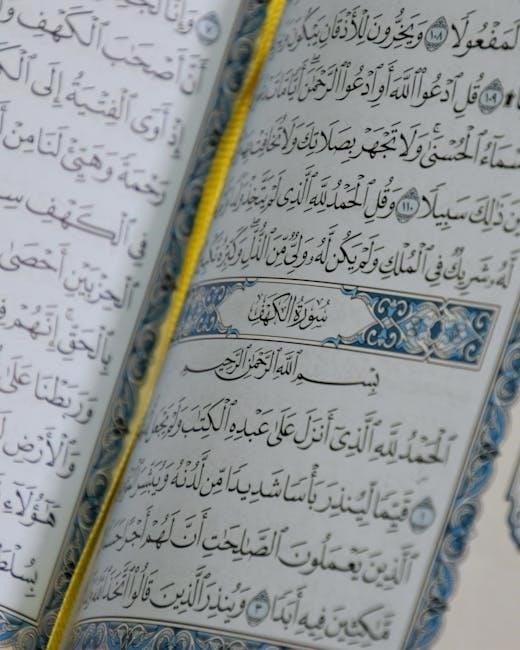Surah Mutaffifin, the 83rd chapter of the Quran, is a Makki Surah revealed in Mecca. It contains 36 verses, 1 rukus, and is located in the 30th Juz. The title, meaning “Those Who Give Less,” reflects its central theme of condemning dishonesty in trade and deeds. It emphasizes Islamic eschatology, warning of accountability in the Hereafter.

1.1 Position in the Quran
Surah Mutaffifin holds a distinct position in the Holy Quran as the 83rd chapter, nestled within the 30th Juz (para) of the Quran. This Surah is part of the Makki group of chapters, meaning it was revealed during the Prophet Muhammad’s (peace be upon him) time in Mecca. Comprising 36 verses (ayat), it is relatively concise yet profound in its message. The Surah is located toward the end of the Quran, reflecting its role in emphasizing key Islamic teachings, particularly those related to honesty, justice, and the Day of Judgment. Its placement in the 30th Juz makes it a frequently recited chapter in congregational prayers, especially during the later portions of the Quran recited in Tarawih prayers during Ramadan. The chapter’s position also underscores its thematic connection to other nearby Surahs, which often focus on eschatological themes and moral guidance. Surah Mutaffifin’s inclusion in the Makki period highlights its relevance to the early Muslim community, addressing issues of integrity and fairness in a society grappling with oppression and corruption. This strategic placement within the Quran’s structure ensures its teachings remain central to Islamic ethics and spirituality.

1.2 Meaning of the Title
The title “Al-Mutaffifin” is derived from the Arabic root word “taff,” which means to give less or to defraud. This term encapsulates the central theme of the Surah, which is a stern admonition against cheating, dishonesty, and injustice, particularly in trade and dealings. The Surah vividly portrays the consequences of such unethical behavior, warning against the Day of Judgment when all deeds will be accounted for. The title serves as a reminder of the moral and spiritual decay that arises from fraudulent practices, emphasizing the importance of fairness and integrity in all aspects of life. By focusing on this theme, the Surah not only addresses economic injustices but also extends its message to the broader spiritual and moral dimensions of human conduct. The title “Al-Mutaffifin” thus becomes a powerful symbol of divine justice, urging believers to uphold righteousness and avoid the pitfalls of exploitation and corruption.

Key Features of Surah Mutaffifin
Surah Mutaffifin is a Makki Surah with 36 verses, emphasizing Islamic eschatology. It warns against dishonesty in trade and deeds, highlighting divine accountability. The Surah underscores the consequences of moral corruption and the importance of righteousness, serving as a moral and spiritual guide for believers to uphold fairness and integrity in all aspects of life.
2.1 Structure and Composition
Surah Mutaffifin is composed of 36 verses, divided into 1 rukus, and contains and 750 letters. Revealed in Mecca, it is classified as a Makki Surah, reflecting its early prophetic context. The Surah’s structure is concise yet profound, beginning with a warning against dishonesty in trade and measures, a central theme throughout. The verses are organized into two main sections: the first addressing the reality of the Hereafter and resurrection, while the second contrasting the destinies of the righteous and the wicked. This structure emphasizes divine justice and accountability, urging believers to reflect on their deeds. The language is poetic and expressive, employing vivid imagery to depict the torments of the disbelievers and the bliss of the righteous. The Surah’s composition is notable for its emphasis on moral and ethical behavior, particularly in economic dealings, aligning with broader Quranic teachings on fairness and integrity. Its concise yet impactful structure makes it a significant part of the Quran’s 30th Juz, offering spiritual and moral guidance to readers. The Surah’s rhythmic flow and powerful imagery enhance its memorability and impact, making it a cherished part of Islamic scripture.
2.2 Focus on Islamic Eschatology

Surah Mutaffifin delves deeply into Islamic eschatology, emphasizing the inevitability of the Day of Judgment and the Hereafter. The Surah vividly describes the contrasting fates of the righteous and the wicked, serving as a stark reminder of divine accountability. It highlights the concept of resurrection, where every individual will be held accountable for their deeds, with the scales of justice weighing their actions. The Surah warns against deceit and corruption, particularly in trade, linking such unethical practices to a rejection of divine truth. It underscores the belief that the present life is transient, while the Hereafter is eternal, urging believers to prioritize righteous living. The vivid imagery of Paradise and Hell serves to reinforce the urgency of moral responsibility. This eschatological focus is central to the Surah’s message, aiming to inspire piety and a steadfast commitment to Islamic values. By exploring the ultimate consequences of human actions, Surah Mutaffifin provides a compelling framework for ethical living and spiritual reflection. Its emphasis on divine justice and the afterlife aligns with broader Islamic teachings, making it a significant and thought-provoking chapter of the Quran.

Theme and Message of Surah Mutaffifin
Surah Mutaffifin emphasizes honesty, fairness, and moral responsibility, warning against deceit and exploitation. It highlights the consequences of dishonesty and the ultimate accountability in the Hereafter. The Surah encourages believers to uphold justice, reflect on divine judgment, and cultivate righteousness, embedding a deep sense of ethical duty and reverence for God’s will.
3.1 Warning Against Dishonesty
Surah Mutaffifin delivers a strong admonition against dishonesty, particularly in trade and dealings. It condemns those who cheat others by altering weights and measures, a practice prevalent during the early days of Islam. The Surah emphasizes that such unethical behavior not only harms others but also leads to severe consequences in the Hereafter. Allah warns that every deed, no matter how small, is recorded and will be brought to justice on the Day of Reckoning.
The Surah vividly describes the fate of those who engage in fraud and deceit, portraying their ultimate regret and remorse. It serves as a reminder to believers to uphold integrity and fairness in all interactions, whether personal or commercial. By highlighting the moral decay that arises from dishonest practices, Surah Mutaffifin encourages believers to reflect on their actions and strive for righteousness.

Moreover, the Surah underscores the importance of fearing Allah and being mindful of His watchfulness over all human actions. It calls for a deep sense of accountability, urging individuals to avoid even the slightest form of injustice. This warning is not only a moral guideline but also a spiritual directive, aiming to purify the heart and ensure a virtuous life.
Through its vivid imagery and stern warnings, Surah Mutaffifin sought to address the rampant dishonesty of its time while offering timeless lessons for all believers. It remains a powerful reminder of the divine expectation of justice, honesty, and ethical conduct in all aspects of life.





